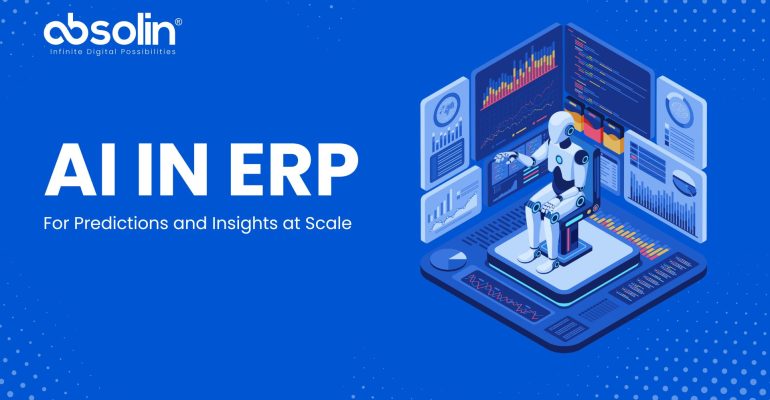AI in ERP: For Predictions and Insights at Scale
Imagine if your ERP system wasn’t just a digital ledger of transactions but a living, thinking strategist — one that could foresee demand spikes before they happened, identify process inefficiencies before they caused delays, and suggest ways to optimize resources before you even thought to ask. This is not the ERP of yesterday; this is the ERP of the AI era — where automation meets intelligence, and decisions aren’t just based on historical reports but on dynamic, data-driven predictions at scale.
Why AI Belongs in ERP
Traditional ERP systems are powerful for integrating business functions, but their capabilities have often been limited to data storage, retrieval, and reporting. AI changes the game by:
- Predicting future trends using historical data and real-time inputs.
- Uncovering deep insights that human analysis might miss.
- Optimizing processes through automation and smart recommendations.
When AI becomes the analytical brain of ERP, businesses move from being reactive to proactive.
Key Benefits of AI in ERP
1. Predictive Forecasting
AI models in ERP can analyze historical sales data, market conditions, and seasonal patterns to accurately forecast demand. This means you can plan production, manage inventory, and allocate resources with a higher degree of certainty.
2. Anomaly Detection
ERP with AI can detect irregularities in data — whether it’s a sudden spike in expenses, a drop in production output, or unusual supplier delays. Early alerts enable faster corrective action, saving both time and cost.
3. Smarter Resource Allocation
AI-driven ERP can recommend optimal workforce deployment, machine scheduling, and procurement cycles, ensuring resources are used where they deliver maximum value.
4. Customer Insights at Scale
By connecting CRM data with ERP systems, AI can uncover buying patterns, customer lifetime value predictions, and churn risks — enabling personalized engagement and retention strategies.
5. Automated Decision-Making
From reordering raw materials to adjusting delivery routes, AI allows ERP to act autonomously within predefined business rules, accelerating response times.
Use Cases Across Industries
- Manufacturing: AI predicts machine breakdowns (predictive maintenance) and optimizes production schedules to prevent bottlenecks.
- Retail: Real-time demand forecasting helps avoid stockouts and overstocking.
- Healthcare: ERP with AI streamlines patient data management, staffing schedules, and inventory for critical supplies.
- Logistics: Predictive routing reduces delivery times and operational costs.
Implementation Considerations
Before integrating AI into ERP, businesses should:
- Assess Data Readiness – AI thrives on clean, high-quality data.
- Identify Priority Use Cases – Start with areas where predictions and insights can have immediate ROI.
- Choose the Right ERP Platform – Opt for ERP systems with built-in AI capabilities or compatibility with AI plugins.
- Train Teams – Human understanding of AI outputs ensures better decision-making.
The Road Ahead
AI-powered ERP isn’t just a technological upgrade — it’s a competitive advantage. As AI models become more sophisticated, they’ll shift ERP from being a system of record to a system of foresight, enabling businesses to anticipate challenges, capture opportunities, and scale intelligently.
Conclusion
In the evolving landscape of enterprise technology, ERP enhanced with AI stands out as a transformative force. Predictions at scale and deep, actionable insights mean companies are no longer just reacting to business conditions — they’re shaping them.
For organizations ready to unlock the next level of operational intelligence, AI in ERP isn’t a future possibility; it’s a present necessity. Absolin specializes in building custom ERP solutions that integrate AI capabilities tailored to your industry and workflows. From predictive analytics and intelligent process automation to real-time reporting and smart decision-making, Absolin ensures your ERP doesn’t just keep up with your business — it drives it forward.
With our end-to-end expertise, we transform ERP systems from static tools into dynamic growth engines, giving your business the foresight, agility, and scalability to lead in the AI-powered era.



